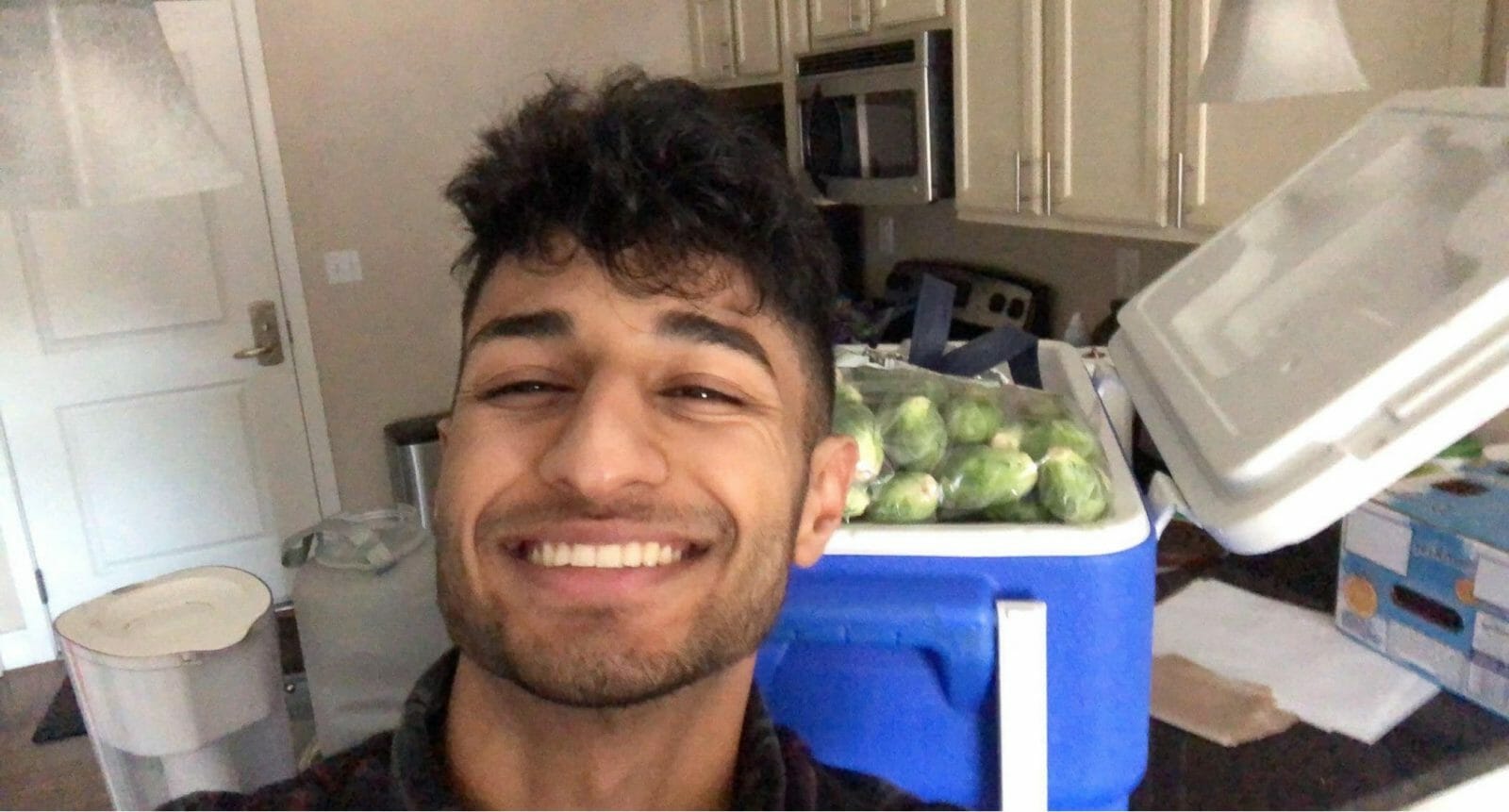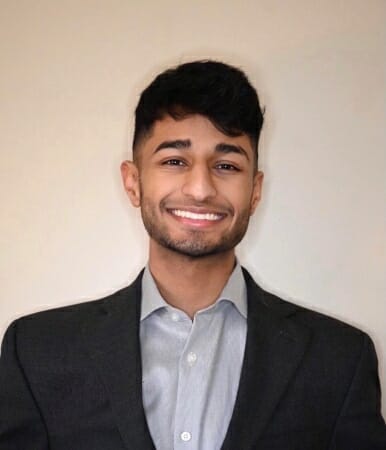College Senior Brings Awareness and Support for the Food Insecure

Meet Daily Point of Light Award honoree Humza Zaidi. Read his story and nominate an outstanding volunteer or family as a Daily Point of Light.
Humza Zaidi is no ordinary college student. The University of Connecticut senior works to end food insecurity with his team of college volunteers and creates relationships with restaurants to make a difference in his community. Experiencing food insecurity firsthand, he understands the systems of inequity that many people are unable to get out of and, as a result, struggle with securing consistent and healthy food sources.
Zaidi’s eyes were reopened during his freshman year on campus when he learned how common it was for his peers to go to bed hungry or resort to fast food because of its cost. Through a partnership with an existing organization on campus, SOS Food Recovery, Zaidi began recycling unused dining passes to students in need. He eventually expanded his efforts off campus and now works with restaurants to decrease their food waste through food donations to local community centers.
Describe how you first discovered the issue of food insecurity and your volunteer activities:
Going back to when I was younger, I grew up in a relatively food insecure household with my parents being in school at all. And having that kind of background, I was always kind of aware of how serious of a concern food insecurity can be. Then, as I grew up and as my family’s income rose, I kind of grew out of that. However, while attending the University of Connecticut I befriended a bunch of students and I found out that a lot of my peers were actually food insecure. For example, they weren’t able to purchase something like a dining hall meal plan. As a result, they would usually end up just having cheap meals at the end of the day.
How our dining hall system works is that you have to purchase the meal plan and you get a lot of these things called flex passes, which you can basically use to swipe other people into the dining hall or to take food out of the dining hall. What happens every single year is that a lot of these passes end up getting wasted. Recycling these swipes was kind of when I first went into overseeing a food insecurity project. I ended up reaching out and talking with another organization on Campus that already works on food insecurity called SOS Food Recovery and through interaction with them, I’ve worked a lot more on campus.
I really wanted to bring that same service into the local community as a whole, so I just ended up getting together a bunch of friends and we went to restaurants and local business owners in this community and set up partnerships with them. Now, we basically will collect all of their unused food and then donate that to the Mansfield Community Center.

How can people get involved in reducing food insecurity?
I think the most straightforward way is really just getting involved with the community centers in your area. A lot of people end up wasting a lot of food at home, which could be used for other things, and you can donate that food pretty easily to people in need. Another important point is educating yourself on how serious of an issue food insecurity is. I feel like a lot of people kind of have the impression, especially if you’re in the middle class, that food insecurity isn’t a huge issue here or that it’s more of an issue when you go to poorer countries. In reality, food insecurity is a really huge issue in the United States. There are tons of people that are just unable to get an adequate food supply. Many people don’t qualify for food stamps and turn to unhealthy fast food and stuff as a daily meals, so that’s another aspect of the food insecurity issue.
Was food insecurity in your community affected by the COVID-19 pandemic?
Yeah, for sure. With the pandemic a lot of people were trying to stay at home, which is obviously something that was necessary to happen, but as a result of that a lot of people weren’t going out and trying to donate their food. On the flip side from the restaurant perspective, one benefit of it was that a lot of restaurants weren’t producing as much waste as before. It’s hard to judge whether it’s benefited or detracted more from food insecurity, but it definitely did have a pretty large effect in my opinion.
What inspires you to volunteer?
I think what really kind of molded me to continue with this project, and volunteering in general, is just having been in a similar situation to a lot of other food insecure individuals. Coming from that background, I understand what it feels like and I really want to give and help these people out as much as possible. I also feel really fulfilled and gratified seeing how much of a difference I can make just from giving a few good meals to people. It just makes a huge difference in our lives, and motivates me to really want to continue this work.
Why is it important for others to give back, especially college students?
So it’s really important to give back in my opinion because of how just how unequal the world is and how unfair it can be because a lot of people find themselves in positions today with no choice. There are a lot of structural issues of being born in a more wealthy household versus being poor born into poverty. We are kind of in this whole challenge together as a whole and humanity as a whole has to work together. We can’t really be leaving people behind. So if you have the ability to do this, what’s stopping you from giving? This is the kind of philosophy that I like to live by.
What would you want others to learn from your service story?
So one important lesson that I learned from this experience is understanding that it’s very easy to think that the systems that we live in, or the infrastructure that already exists, is already good enough without recognizing that there is a lot of room for improvement in existing systems. The big lesson is to just be critical about all of the systems and places that you find yourselves in because I strongly believe that there’s always room for improvement.
Are there any partnerships, programs, or events that you are excited about?
What I’m really excited about is that we’re actually merging our food insecurity efforts to become an official university certified organization. That will help things so much more because it will really be funded by the university and have a lot more opportunities for growth. I’m really excited for that and looking forward to expanding into more restaurants in the Connecticut area, and maybe other branches of the University of Connecticut campus.
Do you want to make a difference in your community like Humza? Find local volunteer opportunities.